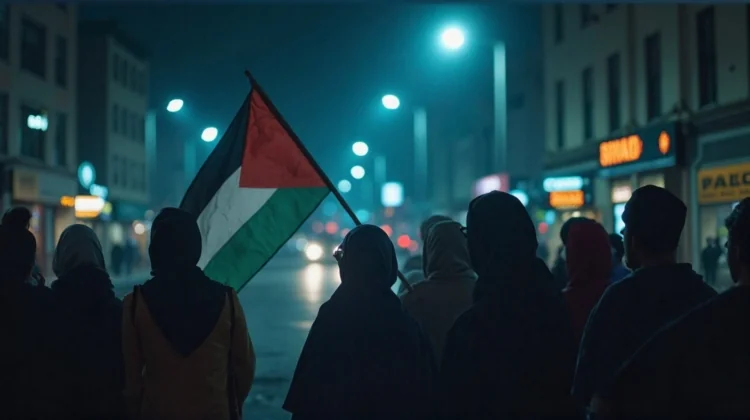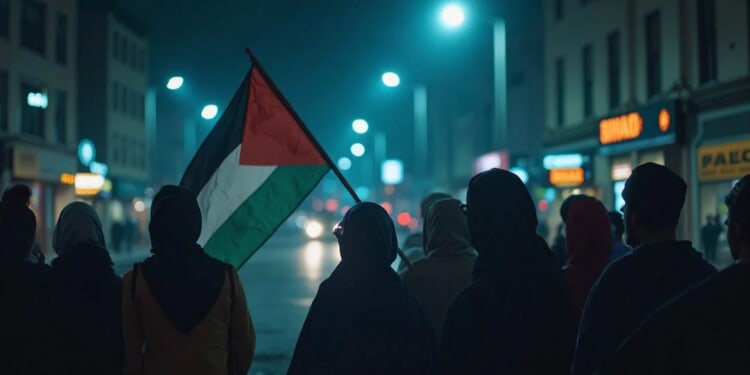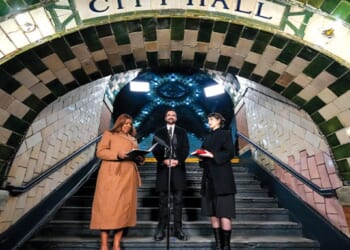
Order Michael Finch’s new book, A Time to Stand: HERE. Prof. Jason Hill calls it “an aesthetic and political tour de force.”
Fifteen years ago, on March 7, 2010, Michigan Live (which bills itself as “Michigan’s #1 News Source”) ran an article by one Kim Schneider about the Islamization of Dearborn, Michigan, which she described as boasting “one of the largest Muslim communities outside the Middle East.”
Schneider wasn’t critical of this development; she was celebratory. Thanks to Dearborn’s Muslims, she proclaimed, the city was awash in “enticing shops, restaurants and bakeries that feature cases stacked high with baklava and fresh pitas” – not to mention “flatbread…made fresh to order in a roaring brick oven,” “platters overflow[ing] with creamy baby ghanoush, shawarma and kabobs,” and “pistachio and honey treats in various combinations and gorgeous pastries.” At the places selling these delicacies, observed Schneider with palpable delight, there were more signs in Arabic than in English. What a wonderfully exotic adventure – and in Michigan, of all places!
Schneider went on to promote Dearborn’s Arab American National Museum, which has “a soaring dome decorated with Arabic calligraphy,” and which, she wrote, seeks “to bring the voices and faces of Arab Americans to mainstream audiences and thereby dispel misconceptions about Arab Americans and other immigrant groups.” One of the exhibits at the museum, noted Schneider, highlighted “the Arab heritage of many well-known political and entertainment figures,” including Ralph Nader, Donna Shalala, Casey Kasem, and Helen Thomas, the longtime dean of the White House press corps. (One wonders if the exhibit was changed when Thomas, less than two months after Schneider’s article appeared, was forced to quit her job with the Hearst newspapers after saying that Israeli Jews should go “home” to Poland and Germany.)
Another exhibit at the museum juxtaposed two sets of images of Arabs. One set consisted of stills from movies and TV shows in which Arabs were shown committing acts of violence; the other contained “photos of everyday Arab Americans,” including “babies” and “grandmothers.” The implicit argument here was that the violence was an ugly and baseless stereotype. To be sure, Schneider did feel obliged to acknowledge that a terrorist attack had recently been committed in the skies over the Detroit area: on Christmas Day 2009. Umar Farouk Abdulmutallab, a Nigerian member of al-Qaeda in the Arabic Peninsula (AQAP) who was a passenger on Northwest Airlines Flight 253 from Amsterdam, had attempted to explode the plane to bits as it prepared to land in Detroit. But rather than acknowledge the seriousness of jihadism and explain its centrality to Islam, the museum responded to the attack by “providing the back story of people of Yemen descent.” Obviously Schneider found this commendable.
Schneider also hailed the Islamic Center of America, which, she wrote, “welcomes anyone willing to learn about Islam and Muslims.” She and friend, she added, “were swept inside by a force of kindness as we stood outside,” and upon entering they were “greeted…warmly” by a guide who offered “a mini-sermon about how Abraham was the father of us all” before helping them fold “the provided scarves we were required to wear over our hair” – a symbol of subordination to men, needless to say, but Schneider didn’t say so.
The piece concluded with some words from the guide: “‘This is your house, too,’ he says. ‘This is not just our house.’ Schneider read those words as a welcome. In fact they were a warning. When Islam moves into new territory, the idea isn’t to live and let live. Islam is a faith of conquest whose adherents have been taught to regard infidel lands as “the House of War.” They’ve learned from the Koran that it’s their job to play nice with the infidels until their numbers reach a certain point – meanwhile crying “Islamophobia!” and “freedom of religion!” whenever anyone breathes a discouraging word about Islam – and thereafter to gradually turn up the pressure, making it clear that Muslims can’t coexist peacefully with infidels until the latter have either converted, submitted, or been unceremoniously butchered.
Fifteen years after Schneider’s billet doux to Islam, Dearborn has more Muslims than ever. And they’ve clearly dropped a lot of the cozy surface stuff that made Schneider so starry-eyed. As I wrote a couple of months ago, “just over half of the city’s population [is] of North African or Middle Eastern ancestry” – a statistic that (so far) no other municipality in no city can match. At a City Council meeting in September, Dearborn’s mayor, Abdullah Hammoud, reacted to a local Christian minister’s politely expressed concern about the renaming of two intersections in honor of a terrorist supporter by calling the minister a racist and telling him: “Although you live here, I want you to know as mayor, you are not welcome here.” (Later, after realizing that he’d let the mask slip a bit too much a bit too early, the mayor apologized for his remark, saying – in an echo of the Islamic Center’s guide – that everyone is welcome in Dearborn.)
Mayor Hammond made headlines again earlier this month, when he dismissed complaints about mosques in Dearborn being allowed to broadcast the Islamic call to prayer at almost all hours of the day and night. On November 19, Mark Tapson reported on a longtime Dearborn resident who lives a quarter-mile from a mosque but who can still hear its call to prayer from inside her house, “sometimes as early as 5:30 a.m.” and as late as 10 p.m. She and other complainants have been dismissed by Hammond, who predictably cites “our constitutional rights to freedom of religion.” Of course Islam only cares about “constitutional rights” until it’s in a position to overthrow the Constitution and replace it with sharia.
On November 18, there was more news from Dearborn. Protesters, reported Niraj Warikoo of the Detroit Free Press, “argued and scuffled” in the city’s streets, “debating religion and immigration.” The Free Press stated that there were three rallies. One of them was organized by “liberal groups supportive of Dearborn and Muslims,” some of whom “held Palestinian flags” (nothing says “liberal” like a Palestinian flag), and who were lent support by one Hussein Dabajeh, who drove a truck on the side of which an electronic display flashed such messages as: “Welcome to Dearborn, an all-American city,” “Welcome to Dearborn, where all faiths live together,” and “Dearborn, the city of coexistence.” A second group featured “anti-Islam protesters led by [Jack] Lang, who was charged in the Jan. 6 protests in Washington, DC, and later pardoned by President Donald Trump” (translation: bad guy).
A third group was led by Anthony Hudson, a candidate for the GOP nomination for governor. Hudson deserves a paragraph of his own. A truck driver who’s in the habit of wearing cowboy hats, he’d initially planned to protest against the Islamic takeover of Dearborn, but according to the Free Press “had a change of heart after spending four days last week in Dearborn and Dearborn Heights, visiting mosques and Muslim leaders….Hudson said he previously thought there was a ‘Muslim takeover’ in Dearborn with sharia, Islamic law, being enforced, but after his visit to four mosques and several businesses, realized that’s not happening.”
What happened to change Hudson’s mind? He told the Free Press that during his Dearborn visit “I got hugs, I got handshakes….I had a lot of men come up to me and say it was nice to meet me.” An article in the Detroit Metro Times quoted Hudson as telling Michiganders that they’d “all been lied to with the propaganda that’s going on about Dearborn, Michigan. I can tell you with absolute faith that everything you’ve been told or taught about Dearborn is a complete fabrication of the truth. Dearborn is a very quiet community. There is a lot of hospitality. I’ve been extremely welcomed here.” The Metro Times article followed this quotation by stating that “Hudson then called this reporter a ‘fucking lesbian’ and used a homophobic slur.” Let’s hope that the Michigan GOP picks a better gubernatorial candidate than this buffoon.
We’ve already seen how good Michigan Live was, fifteen years ago, at promoting Islam. It’s only gotten better since. Its report on the latest Dearborn protests was written by one Fuad Shalhout, who in March of this year wrote for Michigan Live about what Ramadan means to him: “From the moment I wake for suhoor (meal before dawn) in the quiet of the early morning, I feel a sense of peace settle over me….I silently pray for my family’s health, asking for their strength, happiness, and protection.” Unsurprisingly, Shalhout’s article about the recent events in Dearborn centered on lengthy quotes from two supposedly ordinary Muslims. The first, Kelly Elias, wanted readers to know that “I’m from the God of love. I don’t want to hurt anybody….We need to work together and be just. Love each other. We don’t need any problems. Anybody with hate.” Love, love, love! Who could possibly criticize such a beautiful faith?
Shalhout’s other Muslim source, Karrar Haidar, said that “we are a religion of peace and we can coexist as the Abrahamic religions have coexisted in previous times….If they really do believe Sharia is the jurisdiction here in Dearborn, when you walk in, you see a monument in regards of Maryam and Prophet Jesus.” Of course, Islam has “coexisted” in the past with Christianity and Judaism exclusively on its own terms, with adherents of the latter two faiths compelled to accept subordinate social roles and to pay jizya, a tax on non-Muslims that is prescribed in the Koran (9:29). As for “Maryam” and “Prophet Jesus,” these are, needless to say, the Koranic versions of Christianity’s Mary and Jesus, the latter of whom Islam considers not a divinity but merely as a minor prophet, subsidiary to Muhammed.
While Shalhout and other members of Michigan’s mainstream media strove to depict Dearborn’s Muslims as virtuous souls and their critics as bigots, a somewhat different story was being told on X. Lang, for example, wrote: “Today we showed THE WORLD just how VIOLENT and disgusting the Muslim Stronghold of Dearborn TRULY IS!!” He added that he had been “assaulted dozens of times.” Cam Higby, a Seattle-based independent journalist, told a November 18 meeting of Dearborn’s City Council that he’d been “peppersprayed by protesters,” his phone “smashed,” and his microphone receiver stolen by a masked member of the Muslim contingent – and that when he’d reported these crimes to a police officer, the cop, obviously not wanting to arrest the culprit, refused to be of help, or even to give Higby his name and badge number. Adding that he’d been “followed by a drone,” by “vehicles” and by “individuals on foot,” Higby protested that “I shouldn’t feel like a dhimmi in my country. That what I feel like in Dearborn, Michigan!” And Andy Ngo reported that a masked member of By Any Means Necessary (BAMN), an Antifa group, had declared at the same City Council meeting that it was necessary, in Ngo’s paraphrase, “to violently counter those who blaspheme against Islam.”
Before I close, one more tidbit from Michigan Live. It’s not about Dearborn, but about another Muslim-heavy city in the Detroit area. Published on March 14 of this year, it’s by Fuad Shalhout, and it’s entitled “At Flint Islamic Center, Ramadan is a time of community and connection.” The piece is the kind of vapid piece of pro-Islam hype that no self-respecting American media outlet would ever publish about Christianity or Judaism. Shalhout paints a picture of a “busy” evening at the Flint Islamic Center: “Volunteers arrange plates of dates and bottles of water on long tables.” Families exchange “handshakes and hugs.” Some “pray quietly.” Children “sit cross-legged on the beige carpet, waiting for the call to prayer.” After the call sounds, men and women go to “separate banquet halls for dinner.” You know, just like Jim Crow, only for sexes, not races. Yet Shalhout isn’t about to criticize this practice, which, he writes, “follows Islamic traditions of modesty and personal comfort, allowing men and women to eat and socialize freely within their respective spaces.”
And so on. Bottom line: “the mosque is not just a place to pray—it’s a place to be with others and feel part of a community.” Shalhout quotes an Egyptian member of the congregation who speaks of the feeling of “togetherness” he gets at the mosque. Yes, real togetherness – men over here, women way over there. Hey, Michigan Live – great job of letting yourselves be taken over by Islamic apologists, even as much of your state is being subjected to the same kind of takeover.

















